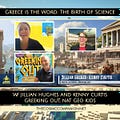Hello everyone!
This week on The Cosmic Companion, we are pondering why Greece is the Word, discussing the birth of science in the ancient world, and what it means for us today.
Later on, we'll be talking with Kenny Curtis and Jillian Hughes, hosts of the Greeking Out podcast, and authors of a new book of the same name, from Nat Geo Kids.
Once upon a time, in the sunny lands of Ancient Greece more than 25 centuries ago, a bunch of curious folks decided to ask some big questions. "Why does the sun rise?" "What are stars?" "Why do planets move?". They were tired of attributing everything to the whims of gods. Much like overgrown toddlers, they wanted ANSWERS, and they wanted them NOW! (errr… then)...
Jillian Hughes and Kenny Curtis appear on The Cosmic Companion 7 October 2023. Creative Commons 4.0 Attribution 2023 The Cosmic Companion
The Greeks had a knack for asking questions that were way ahead of their time. More than 2,500 years before our age, a woman named Aspasia was known for holding gatherings of some of the greatest minds of her day, including Plato and Socrates. A gifted conversationalist, tales tell that she founded a school for girls, a groundbreaking advance for the era.
Democritus of Abdera had the crazy idea that all matter was composed of individual bits, which we call atoms. Building on the work of his mentor, one day around 425 BCE, he may have just been walking around, minding his own business when he thought, "What if everything is made up of tiny, invisible particles?" Boom! The concept of atoms was born.
Then there was Pythagoras who had a thing for triangles. He may have been sitting around one day, doodling triangles in the sand when he realized that the square of the hypotenuse (the side opposite the right angle) is equal to the sum of the squares of the other two sides. Mind blown! And thus, the Pythagorean theorem came into existence.
During the 4th Century BCE, Hippocrates took one look at medicine and said, "This needs some work."
[Not my words exactly, but… Yeah, sure.]
He insisted that diseases were not punishments from angry gods but had natural causes that could be studied and treated. This revolutionary idea paved the way for modern medicine.
Not long after, Agnodice of Athens practiced medicine dressed as a man, at a time when women were not allowed to be doctors. Thanks to her, laws in Athens preventing women from becoming doctors were overturned.
[AGN: You're welcome!]
But it wasn't all work and no play for these ancient scientists. Legend has it that Archimedes discovered his principle while taking a bath. He noticed that the water level rose as he got into his tub and realized this could be used to determine volume. He was so excited that he ran through the streets naked shouting "Eureka!" (which means "I found it!"). Now that's what I call a eureka moment!
The birth of science in ancient Greece is a story of curiosity, ingenuity and occasional naked sprinting through the streets. The ancient Greeks might not have had all the answers, but they sure knew how to ask interesting questions!
With questions come answers, and for a few of each, we're talking with Jillian Hughes and Kenny Curtis about their new podcast and book, Greeking Out, from Nat Geo Kids.
---
Now. Let's talk about our friend Pythagoras. Remember him? The triangle guy? Well, his theorem is still used today in everything from architecture to video games. Yes, you heard it right! Every time you play a game of Fortnite or Minecraft, Pythagoras is there, making sure everything looks just right.
Next up is Hippocrates, the father of modern medicine. His idea that diseases have natural causes was a game-changer. Today, doctors across the globe follow his principles. So, the next time medicine helps you out, remember to say a silent thank you to Hippocrates (but maybe skip on the leeches and bloodletting).
And who could forget Archimedes? His principle helps us design ships and submarines. And yes, he's also the reason why your bathwater rises when you get in. So, the next time you're enjoying a relaxing bath, spare a thought for Archimedes (and maybe keep your "Eureka!" moment to yourself).
Last but not least, Democritus' atomic theory is at the heart of modern physics and chemistry. It's why we can build everything from skyscrapers to smartphones. So every time you send a text or take a selfie, remember that it's thanks, in part, to a Greek guy who lived over 2000 years ago.
So there you have it! The Ancient Greeks might be long gone, but their discoveries are still very much alive and kicking. It just goes to show that great science never goes out of style!
Next week on The Cosmic Companion, we look at Global Warming: It's Not Just Hot Air!. We'll look at the science of climate change, and how our world could change in the coming decades. We'll be talking with Elizabeth Rusch, author of The Twenty-One, telling the story of a group of young people using the legal system to help reverse climate change.
Make sure to join us, starting on 14 October, anywhere you see or hear The Cosmic Companion. While you are there, go ahead and do all that sharing and subscribing stuff. It'd be pretty cool if you did. Yup. Pretty cool indeed…
Clear skies!
---
[COLD OPEN]
So this is the future. Interesting.
Well, good evening, everyone! I must say, when I was told I'd be time-traveling, I expected to see the future of Greece, not to land in 'Grease.' However, I am not entirely to blame, by Jove!
Here are "The Top 10 Reasons I Thought Grease was Greece:"
#10 When my agent said he booked me on a tour of Grease, I thought he said Greece. A natural mistake.
#9 I thought I saw young people in togas and a group of Spartan warriors. It turns out they were wearing "poodle skirts" and "leather jackets."
#8 All the spontaneous singing and dancing made me think I was near a Greek theatre.
#7 I saw chariots without horses. I'm a scientist. Studying those was just natural.
#6 One of the horseless chariots had lightning bolts on it. I naturally believed it to be a chariot of Zeus.
[ZEUS APPEARS
No. Not me. I wouldn't drive anything that ostentatious.
FADE]
#5 The sight of people eating in a diner reminded me of symposiums, though I have been told that wine has been replaced with milkshakes. Those are pretty good, honestly. Have you ever tried a flavor called "chocolate?"
#4 Hearing about a beauty school dropout, and seeing a woman surrounded by other women in pink, I naturally believed them to be Aphrodite and her priestesses. She still owes me 10 drachma.
#3 Watching a dance-off at the local gymnasium made me think of athletic competitions in Ancient Greece. Plato would have loved it.
#2 Coming across what I thought was an open-air play, it turned out to be something called a "drive-in movie." I think those are going to be pretty popular in a few decades.
#1 And, the NUMBER ONE REASON I Thought Grease was Greece is… [DRUM ROLL] Seeing this teenage drama unfold, I mistook it for a Greek tragedy.
OK. I'm ready to go back. Send James Maynard in, already…
[FADE. OFF SCREEN:
-unintelligible-
What do you MEAN the chariot flies? That's ridiculous.
]
Clear skies!
James
























Greece is the Word: How science was born: With Kenny Curtis and Jillian Hughes, Greeking Out, Nat Geo Kids